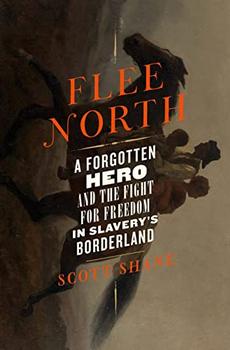Summary | Excerpt | Reviews | Beyond the Book | Readalikes | Genres & Themes | Author Bio

A Forgotten Hero and the Fight for Freedom in Slavery's Borderland
by Scott Shane1
Most Inhuman System That Ever Blackened the Pages of History
A memory that would stay with Thomas Smallwood all his long life mixed pride with wry wonderment. As a young boy he was taught to read by the couple who enslaved him, a skill that distinguished him not just from other enslaved children but from most Black adults as well. In their rural community of Bladensburg, just east of the District of Columbia boundary, he became a sort of neighborhood spectacle, asked repeatedly to perform for the friends and neighbors of his owner.
They were amazed at the fact that a black or colored person could learn the Alphabet, yea, learn to spell in two syllables. I appeared to be a walking curiosity in the village where I then lived, and when passing about the village I would be called into houses, and the neighbors collected around to hear me say the Alphabet and to spell baker and cider, to their great surprise, (which were the first two words in the two syllables of Webster's Spelling Book.)
It is an affecting scene—the cute Black prodigy wowing his white and Black neighbors with his mastery of the leading primer of the day. The passage presages Smallwood's dual identity in adulthood, as a Black man but one whose literacy, wide learning, and political consciousness would set him apart, first in slavery and later in freedom. He would develop the power to operate behind enemy lines in a slave society, studying the enslavers and their allies while rarely attracting notice.
Yet years later, as he wrote his memoir, Smallwood did not linger for long on the sentimental appeal of his childhood skill at spelling. Characteristically, he went straight to the larger context and its bitter significance in politics and power. He knew his boyish feats were seen as extraordinary only because he was Black and enslaved:
This may afford the reader a glimpse into the abyss of intellectual darkness into which the African race in America has been so long purposely confined, to serve the avarice and ends of their tyrannical oppressors.
This poignant childhood memory and Smallwood's brutally clear-eyed adult understanding of it capture a critical fact about Smallwood's early life. He was born into slavery, but unlike the vast majority of people in bondage, he benefited from unusual enslavers who helped him educate himself and obtain his freedom. His "slave narrative," as his memoir has sometimes been labeled by the few scholars to take notice of it, is no catalog of the horrors he suffered. Instead, he devotes only a few paragraphs to the thirty years he spent in slavery, lingering mainly on his luck in the owners he got by virtue of a will and a wedding.
Smallwood was born on February 22, 1801, in Prince George's County, a Maryland jurisdiction of tobacco plantations and small farms bordered to the west by Washington, D.C. When he sat down decades later to write his memoir, he said not a word about his parents, a curious omission that may have signaled lingering personal pain. It is quite possible that Smallwood, like so many enslaved children, was separated permanently from his parents in very early childhood, either because they were dispatched to different farms by the dictates of an estate settlement or because his parents were sold to a slave trader who shipped them to the Deep South. Archival records shed no light, but Smallwood would later write fiercely of the domestic slave trade: "Who can calculate the amount of suffering occasioned by the sudden snapping of conjugal and parental ties, among those poor creatures, by an unrighteous law?"
What is known is that as small children Thomas and his sister, Catharine, called Kitty, were inherited by a Prince George's County woman, Sarah Ferguson, and her children. In 1808, Sarah Ferguson married a cousin, John Bell Ferguson. It turned out to be a stroke of luck for Thomas, then seven. John Ferguson was a Methodist minister who frowned upon slavery, but by Smallwood's account he was constrained by the terms of his wife's inheritance:
Copyright © 2023 by Scott Shane






Your guide toexceptional books
BookBrowse seeks out and recommends the best in contemporary fiction and nonfiction—books that not only engage and entertain but also deepen our understanding of ourselves and the world around us.